In a significant escalation of military presence, Egypt has deployed tanks to the Sinai Peninsula, a move that underscores the nation’s ongoing struggle against insurgent groups in the region. This deployment includes both Patton and Abrams tanks, which represent a significant upgrade in Egypt’s military capabilities. The decision aims to strengthen the Egyptian Armed Forces’ ability to combat insurgency, particularly in areas plagued by violent extremism.
With a backdrop of recent attacks by militant groups, the Egyptian government has increasingly prioritized securing the Sinai, which has long been a hotbed for various insurgent factions. The Sinai Peninsula has been home to a number of militant organizations, including those affiliated with ISIS and other jihadist groups. Reports indicate that these groups have been involved in numerous attacks against both military and civilian targets.
“The situation in Sinai has reached a critical point, and the deployment of tanks is a necessary measure to restore security,” stated a military spokesperson. This perspective highlights the urgency felt by the Egyptian authorities as they seek to stabilize a region that has witnessed relentless violence over the past decade.
The urgent situation in Sinai necessitates tank deployment to restore security and stabilize a region plagued by violence.
The choice to deploy Patton and Abrams tanks is strategic, as these armored vehicles are known for their advanced firepower and durability. They are expected to provide a formidable presence on the ground, deterring potential attacks and enabling ground forces to conduct offensive operations against insurgent positions.
Analysts suggest that this move reflects a broader strategy by the Egyptian government to utilize heavy military assets in counterinsurgency operations, which may signal a shift in tactics in response to the evolving threat landscape. While the deployment has been met with support from some quarters, it has also drawn criticism.
Observers argue that an increased military presence may not address the root causes of insurgency, such as poverty and lack of political representation. “Military solutions alone are insufficient for long-term peace,” remarked a regional expert. This sentiment echoes a growing understanding that a multifaceted approach, combining military might with social and economic reforms, is essential for achieving lasting stability.
As Egypt intensifies its military efforts in the Sinai Peninsula, the situation remains fluid and complex. The deployment of tanks is a bold assertion of military strength, yet its effectiveness will depend on the ability of the Egyptian government to simultaneously address the underlying issues contributing to the region’s instability.
The eyes of the international community remain focused on Sinai, where the balance between military action and diplomacy will shape the future of security in this volatile region.














